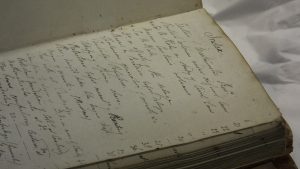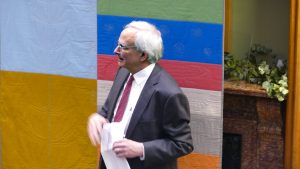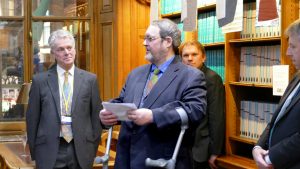We’ve done it. They’re finally here. Late last week I was lucky enough to go down to London and pick up the Lyell notebooks.

The first step in gaining custody was to head to Sotheby’s on New Bond Street with the paperwork to prove they could be released. It’s a curious process of heading down to pre-sales to prove ownership and then be given a token for collection. I was then taken to their manuscripts and rare books department to pick up the archive. There I got my first glimpse of them.
Their scale surprised me. They are more compact and very consistent compared to even the pictures I’d seen of them and with my love of palaeography and our plans for deciphering them, I had to have a look at the content. Having been to Catania in Sicily last year, I picked the Sicily volume and was immediately struck by the depiction of the landscape around Mount Etna and the flow of his hand across the page providing detail. I know we’re going to have a lot of fun making these available in the future!
I had to draw myself back from getting immersed as our colleagues George and Ryan had arrived from Constantines, who were going to look after me and the notebooks, getting us back to Edinburgh securely. And wow what a large lorry, for small notebooks, down the tiny London lanes!
After checking every volume and packing in order securely, I signed the final piece of paperwork and we could take the notebooks on the next stage of their journey.
They were taken to a secure location, through the streets of London in our rather large lorry, with me sat up top in the cab with a birds eye view. I wondered what Lyell’s view of London was, having lived there in the 1830s and how very different the environment and landscape was now.
The next day we were at the secure location at 6am ready to leave. While the team were getting ready, I chatted to a curator from the British Museum, taking items for exhibition out to the Far East. Never thought, at 6am I’d be meeting such interesting people and sharing our experiences of couriering our rare and unique items throughout the world!
George, Ryan and myself soon set off through London, watching it wake and get busy. Over the next 9 ½ hours we drove north through the changing landscape, with all kinds of weather, from rainbows and hail to bright sunshine, looking at moors and hills, farmland planes to forests. I wondered again what Lyell would have thought, interpreted and seen.

At about 3:30pm we arrived back in Edinburgh, after a very smooth journey (worst bit was the traffic in Edinburgh!) and were met by Grant and Norman, with these photos being taken, so we could show you their arrival.



So, they are here and the next part of our work begins with our archivists and conservators checking and listing them over the next couple of weeks. I’ve delighted to have had my Lyell adventure, picking up these notebooks, so they now can be made available to the world.



Thanks to George and Ryan from Constantines who were consummate professionals and looked after the notebooks and myself with good humour and brilliant driving skills, getting us to Edinburgh safely.

Rachel Hosker
Archives Manager and Deputy Head of Special Collections



















